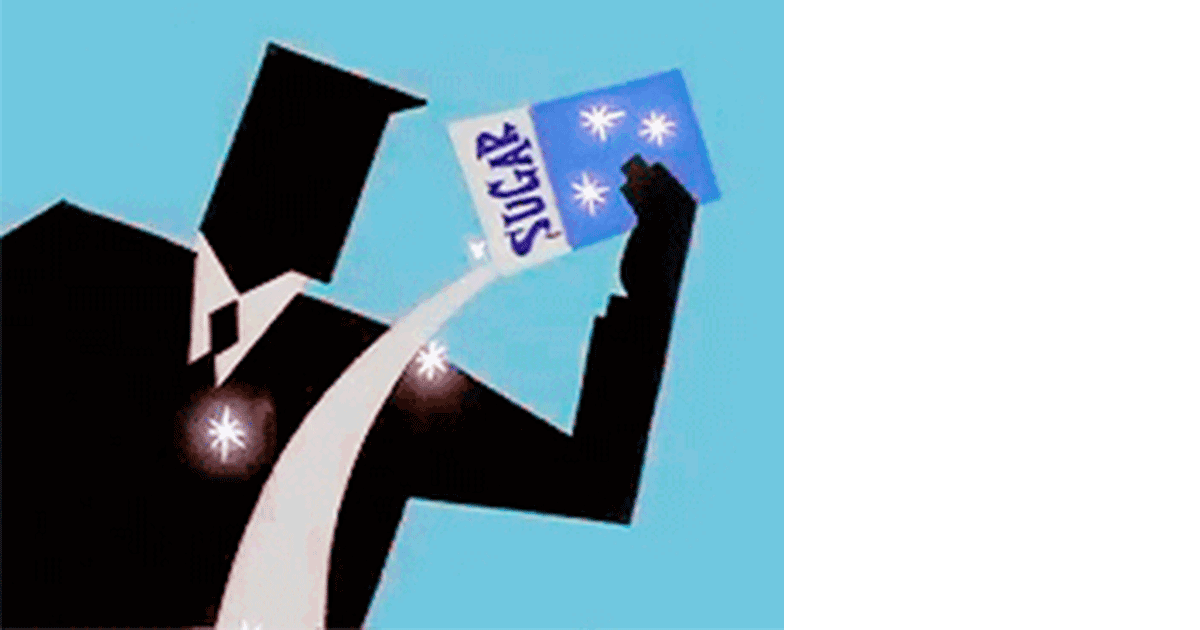What Are Sugar Alcohols and Are They Healthy?

Photo: Giphy @foxadhd
Now that fat has reclaimed its place in the public's heart as a necessary (and not-so-unhealthy) nutrient, sugar has taken on the role of public health enemy number one. Many people aim to cut back on the sweet stuff by opting for low-sugar or even sugar-free foods-lots of which still mysteriously have a sweet flavor. Hmm.
So how, exactly, do manufacturers create these products to satisfy a sweet tooth without actually skyrocketing the sugar content? One answer: sugar alcohols.
What are sugar alcohols anyway?
No, sugar alcohols don't contain alcohol as you know it (aka ethanol, the compound that gets you tipsy), though they do have an oxygen-hydrogen bond like the liquid in your happy hour drink.
At the most basic level, sugar alcohols are naturally occurring carbohydrates, says Angela Lemond, R.D.N, a spokesperson for the Academy of Nutrition and Dietetics and founder of Lemond Nutrition. Some fruits naturally contain them, like stone fruits (think: peaches and plums) and blackberries, as well as sugar-free gum and candy, low-sugar protein bars, and "healthy" ice creams.
You'll know a product contains a type of sugar alcohol by checking the ingredient list, says Bonnie Taub-Dix, R.D.N., author of Read It Before You Eat It: Taking You from Label to Table. Take note if you spot words ending in an "-ol" (such as sorbitol, mannitol, erythritol, or xylitol), as that's the sign of a sugar alcohol. While the actual grams of sugar may stay low for a product with these ingredients, the total number of carbs could still be high. (Here's your guide to reading the newest nutrition labels.)
Manufacturers often use a chemically produced sugar alcohol as a lower-calorie sweetener, says Taub-Dix. Compared to regular sugar sources, they have about one-half to one-third the calories. Sugar alcohols often have 1.5 to three calories per gram, whereas regular sugar has about four. (Sugar alcohols do have more calories than your typically calorie-free artificial sweeteners.)
Are sugar alcohols safe to eat?
For some people, they could offer benefits-particularly for those with pre-diabetes or diabetes, or those keeping a close eye on sugar levels, says Lemond. Your body metabolizes sugar alcohols slower than regular sugar, she explains, so they don't cause the same spike in insulin levels.
Foods sweetened with sugar alcohols are also a great choice if you're craving something sweet but are watching your total calorie intake. Plus, if you're concerned about oral health, you can enjoy a treat without worrying about your teeth, since sugar alcohol tends to cause less dental cavities, says Lemond.
Do sugar alcohols have any health downsides or side effects?
The major bummer about sugar alcohols is that they can cause some serious gastrointestinal discomfort. Depending on your stomach sensitivities, or if you simply overdid it one day, you might experience bloating, gas, and diarrhea, says Lemond. (Probably not the post-dessert feels you're looking for.)
People with irritable bowel syndrome (IBS) should pay particular attention to sugar alcohols, explains Lemond. They contain high amounts of polyols (a type of carbohydrate), which people following a low-FODMAP diet-namely, IBS sufferers-can't digest very well. In other words, hello, belly problems! (And, surprisingly, GI issues are super common in women.)
Both experts mention that the most important thing to know about sugar alcohols is how you feel after eating them. It's a good idea to watch your sugar intake, and sugar alcohols could provide a healthy alternative-but portions sizes still matter. And if they send you to the bathroom or give you an instant food baby after a few bites, they're probably not the best bet.

